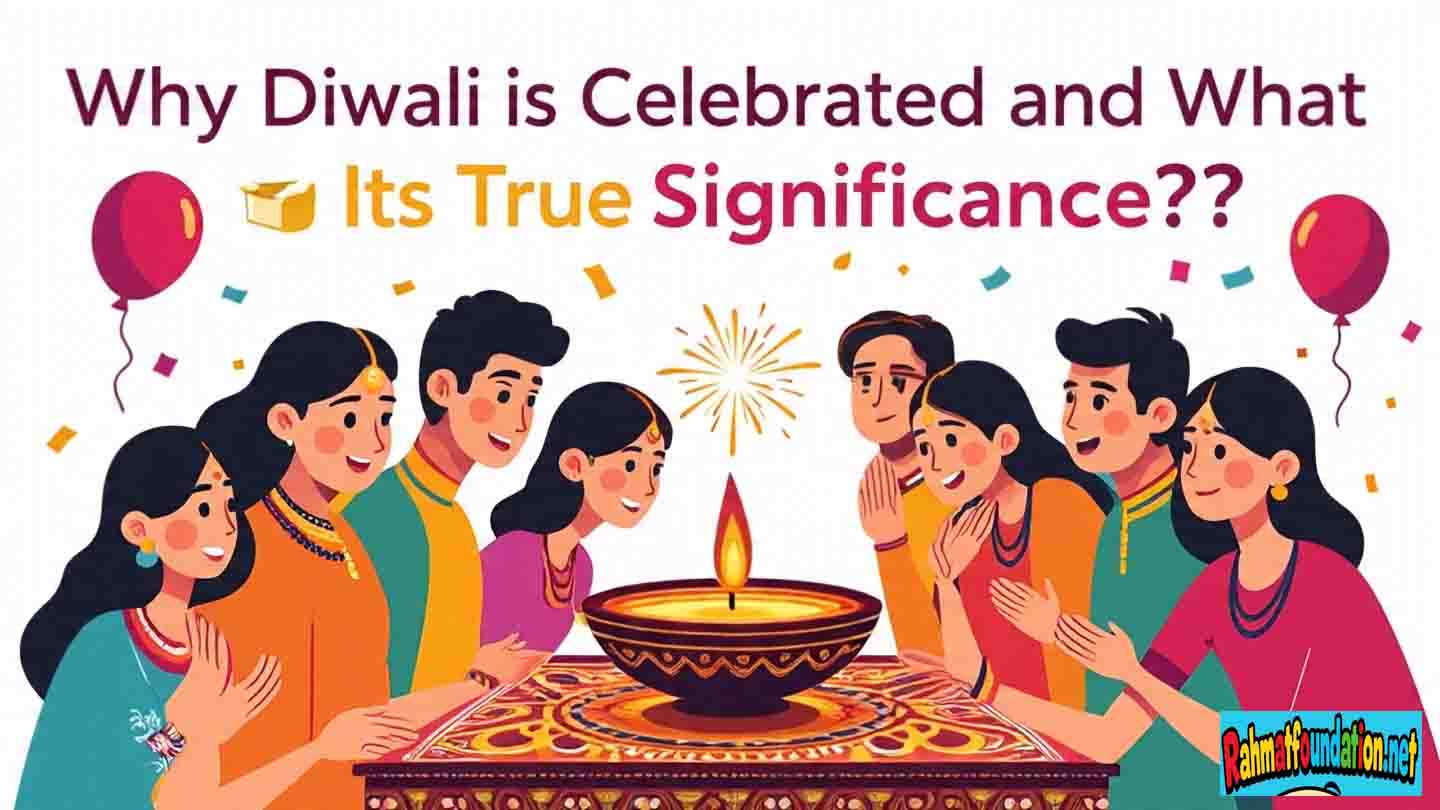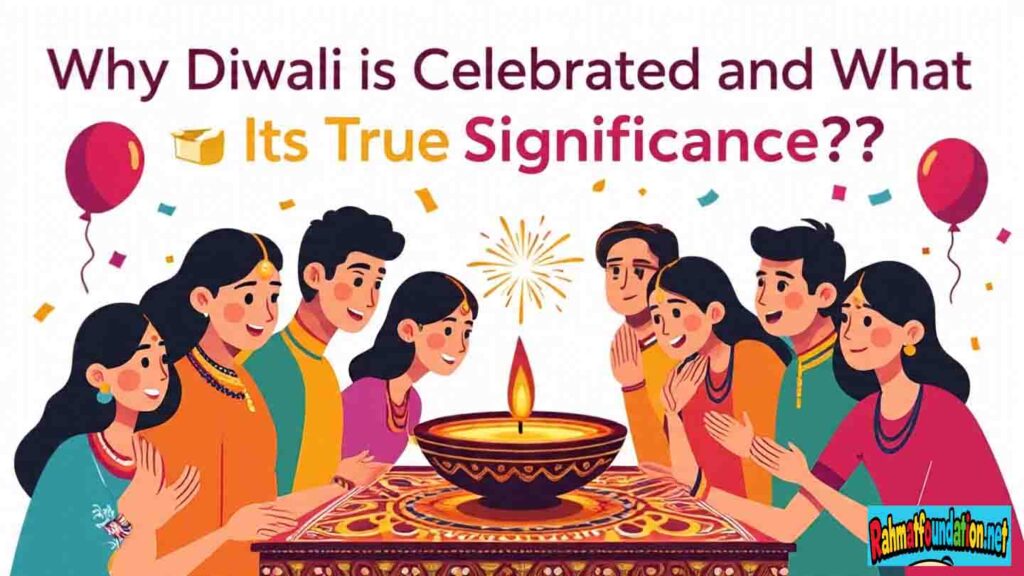Why Diwali is Celebrated and What Is Its True Significance?

1. Introduction: What is Diwali?
Diwali, also known as Deepavali, is one of the most widely celebrated festivals in India and across the world by millions of Hindus, Sikhs, Jains, and Buddhists. Often referred to as the “Festival of Lights,” Diwali symbolizes the victory of light over darkness, knowledge over ignorance, and good over evil. Celebrated for five days, Diwali is marked by the lighting of lamps (diyas), fireworks, exchanging gifts, and performing religious rituals.
The question often asked is: Why is Diwali celebrated and what is its true significance? This article explores the roots, legends, cultural importance, and modern relevance of Diwali in depth.
Table of Contents

2. The Historical Origins of Diwali
Ancient India and Diwali’s Emergence
Diwali’s history dates back thousands of years and is deeply rooted in Indian culture. Ancient texts, such as the Padma Purana and Skanda Purana, describe Diwali as a time of joyous celebration after the harvest season, symbolizing prosperity and the end of darkness.
It is believed that the festival initially began as a harvest festival celebrated by farmers in ancient India to mark the end of the agricultural season and the beginning of the new financial year. The sparkling diyas symbolized light guiding farmers toward future prosperity.
👉 Learn more about Indian ancient festivals (DoFollow External Link)
3. Mythological Legends Behind Diwali
The Return of Lord Rama to Ayodhya
One of the most famous legends associated with Diwali is the return of Lord Rama to Ayodhya after 14 years of exile and defeating the demon king Ravana. The people of Ayodhya lit rows of oil lamps to welcome Lord Rama, Sita, and Lakshman back, celebrating the triumph of good over evil.
This legend symbolizes moral righteousness and the importance of duty, sacrifice, and devotion.
The Story of Lord Krishna and Narakasura
Another legend narrates how Lord Krishna defeated the demon Narakasura, who had terrorized the heavens and Earth. The day of Narakasura’s defeat is celebrated as Naraka Chaturdashi, part of the Diwali festival, signifying the victory of divine power and righteousness.
Goddess Lakshmi’s Blessings
Diwali is also closely linked with Goddess Lakshmi, the deity of wealth and prosperity. It is believed that on Diwali night, Lakshmi emerged from the ocean of milk during the churning of the cosmic ocean (Samudra Manthan). People light lamps to invite Lakshmi into their homes, hoping for wealth and happiness.
👉 More about Goddess Lakshmi’s origin (DoFollow External Link)
4. The True Significance of Diwali
While the surface celebration of lights and sweets is well-known, the true significance of Diwali goes much deeper.
Spiritual Meaning
Diwali emphasizes the inner spiritual light that dispels ignorance and darkness within individuals. It encourages self-reflection, forgiveness, and renewal of moral values.
Symbol of Prosperity
Economically, Diwali marks the beginning of the financial year for many businesses in India. It is a time for cleaning homes, buying new clothes, exchanging gifts, and starting new ventures with hope and optimism.
Promoting Social Harmony
Diwali is a unifying festival that transcends religious and regional differences. People from different backgrounds come together to celebrate, promoting peace, love, and social harmony.
5. How Diwali is Celebrated Across India
Northern India
In states like Uttar Pradesh, Punjab, and Delhi, the focus is on worshipping Goddess Lakshmi and Lord Ganesha. The evening is brightened with countless diyas, and fireworks light up the sky. The famous market stalls are full of sweets, diyas, and decorations.
Southern India
In Tamil Nadu, Karnataka, and Andhra Pradesh, Diwali is celebrated as the day Lord Krishna defeated Narakasura. Early morning oil baths, bursting crackers, and exchanging sweets mark the day.
Eastern India
In West Bengal and Odisha, Diwali overlaps with Kali Puja, where Goddess Kali is worshipped. Homes are adorned with intricate rangoli patterns, and temples are brightly lit.
Western India
In Maharashtra and Gujarat, Diwali also signifies the start of the new business financial calendar, making it an important occasion for traders and entrepreneurs. Families perform Lakshmi Puja, decorate homes, and exchange sweets. It is also a time for traditional music and dance performances.
6. Diwali’s Global Influence
Today, Diwali is celebrated by the Indian diaspora around the world—in the USA, UK, Canada, Australia, UAE, and more. Communities organize cultural fairs, Diwali melas, and public fireworks displays to promote Indian culture.
👉 Explore Diwali celebrations worldwide (DoFollow External Link)
Many non-Indians also participate in the festivities, enjoying the lights, sweets, and joyous atmosphere.
7. Diwali and the Spirit of Togetherness
At its heart, Diwali is a festival that fosters family bonding and social unity.
- Family Reunions: Diwali brings relatives and friends together, creating joyful moments of shared celebrations and cherished memories.
- Sharing Sweets and Gifts: A way to express love and gratitude.
- Renewal of Relationships: Many use this time to forgive past grievances and start anew.
8. The Environmental Concerns of Modern Diwali
While Diwali is known for fireworks and lights, the increasing use of firecrackers has raised significant environmental concerns.
- Air pollution spikes during Diwali, contributing to respiratory problems.
- Noise pollution affects both humans and animals.
- Many are now adopting eco-friendly alternatives like LED lights and organic fireworks.
🌱 Learn about eco-friendly Diwali practices (DoFollow External Link)
9. Traditional vs Modern Diwali Practices
Traditional Diwali
- Handmade diyas and natural decorations.
- Home-cooked sweets and organic rangoli designs.
- Simple and heartfelt celebrations with close family.
Modern Diwali
- Commercial fireworks and store-bought decorations.
- Expensive gifts and branded sweets.
- Larger, more elaborate parties.
Despite modernization, many families are returning to traditional practices for a more meaningful celebration.
10. Diwali Special Foods and Sweets
Food plays a significant role in Diwali celebrations. Popular dishes include:
- Sweets: Gulab Jamun, Jalebi, Kaju Katli, Ladoo.
- Snacks: Samosa, Chakli, Sev.
- Beverages: Thandai, Masala Chai.
These delicacies are shared among family, friends, and neighbors, spreading joy and happiness.
11. Diwali Safety Tips and Practices
- Use eco-friendly firecrackers.
- Avoid overcrowded fireworks displays.
- Ensure children are supervised during celebrations.
- Use electrical lights instead of fire-lit diyas to reduce accidents.
- Keep first-aid kits handy for minor burns or injuries.
12. Conclusion: Diwali’s Eternal Message of Light
Diwali is far more than just a festival; it is a celebration of life’s most profound values—hope, renewal, love, and the victory of good over evil. It reminds us to light up the world with kindness and compassion, not just diyas but through our actions.
In every sparkler that lights up the sky, in every diya glowing in a home, lies the timeless message: no matter how dark the times may be, light and goodness will always prevail.
13. Frequently Asked Questions (FAQs)
Q1: When is Diwali celebrated?
A: Diwali is celebrated on the Amavasya (new moon day) in the Hindu month of Kartika, typically in October or November.
Q2: What is the main significance of Diwali?
A: Diwali symbolizes the victory of light over darkness, knowledge over ignorance, and good over evil.
Q3: Why are diyas lit during Diwali?
A: Diyas represent the light of knowledge, prosperity, and hope, driving away darkness and negativity.